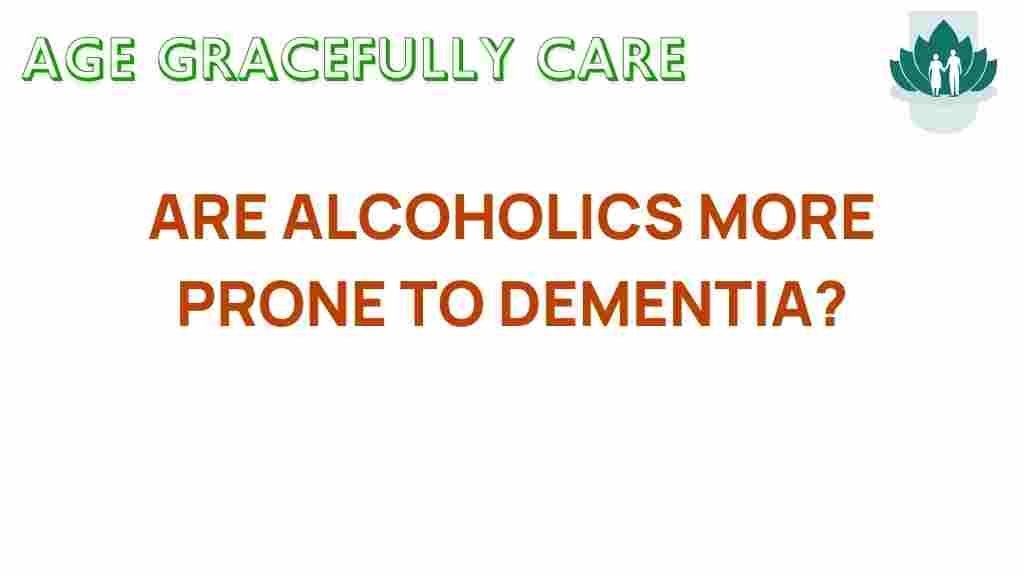Are Alcoholics at Greater Risk of Developing Dementia?
As our understanding of the human brain continues to evolve, researchers and healthcare professionals are increasingly examining the links between alcohol consumption, addiction, and cognitive health. One of the most pressing questions in this area is whether alcoholics are at a greater risk of developing dementia. This article delves into the relationship between alcohol, dementia, and various risk factors that contribute to cognitive decline. We will explore studies that highlight these connections and discuss strategies for prevention, ultimately emphasizing the importance of maintaining brain health.
Understanding Dementia and Its Risk Factors
Dementia is an umbrella term for a range of cognitive impairments that affect memory, thinking, and social abilities severely enough to interfere with daily life. It encompasses various types, including Alzheimer’s disease, vascular dementia, and frontotemporal dementia. The risk factors for developing dementia are multifaceted and can include:
- Age
- Genetics
- Cardiovascular health
- Diabetes
- Head injuries
- Substance abuse, including alcohol
Among these, alcohol consumption stands out as a significant factor that can influence brain health and the onset of cognitive decline.
The Impact of Alcohol on Brain Health
Alcohol is a neurotoxin, meaning it can have detrimental effects on the brain. Chronic alcohol consumption can lead to structural and functional changes in the brain, including:
- Brain shrinkage
- Neuroinflammation
- Disruption of neurotransmitter systems
These changes can impair cognitive functions, leading to issues with memory, reasoning, and problem-solving abilities. Additionally, heavy drinking can result in alcohol-related brain damage (ARBD), a condition that can include dementia-like symptoms.
Studies Linking Alcohol and Dementia
Numerous studies have explored the connection between alcohol consumption and dementia. Here are some key findings:
- A longitudinal study published in the “American Journal of Psychiatry” found that individuals who consumed more than two alcoholic drinks per day had a significantly higher risk of developing dementia compared to moderate or non-drinkers.
- Research from the “Journal of Alzheimer’s Disease” indicated that individuals with a history of alcohol use disorder were at an increased risk of Alzheimer’s disease and other dementia types.
- A meta-analysis in “Neuroepidemiology” concluded that heavy alcohol consumption was associated with a 30-40% increased risk of dementia compared to light or moderate drinkers.
These studies suggest a clear link between alcohol consumption and cognitive decline, particularly in individuals with a history of addiction.
How Addiction Contributes to Dementia Risk
Addiction to alcohol not only exacerbates the risks associated with its consumption but can also lead to a range of lifestyle factors that further increase the likelihood of dementia. These include:
- Poor nutrition: Alcoholics often neglect their diet, leading to deficiencies in essential nutrients that support brain health, such as B vitamins.
- Social isolation: Addiction can strain relationships, leading to increased loneliness, which is a known risk factor for cognitive decline.
- Increased incidence of accidents: Alcohol misuse raises the risk of falls or head injuries, which can contribute to cognitive issues.
Addressing addiction is crucial for reducing the risk of developing dementia and promoting overall mental health.
Prevention Strategies for Alcohol-Related Dementia
While the association between alcohol and dementia is concerning, there are several steps individuals can take to mitigate their risk:
1. Limit Alcohol Consumption
Moderation is key. The Centers for Disease Control and Prevention (CDC) recommends that women limit their alcohol intake to one drink per day and men to two drinks per day. This can help reduce the risk of cognitive decline.
2. Maintain a Balanced Diet
Eating a diet rich in fruits, vegetables, whole grains, and lean proteins can support brain health. Foods high in omega-3 fatty acids, antioxidants, and vitamins can be particularly beneficial.
3. Stay Physically Active
Regular exercise improves blood flow to the brain and can help ward off cognitive decline. Aim for at least 150 minutes of moderate aerobic activity each week.
4. Engage in Brain-Healthy Activities
Activities that challenge the brain, such as puzzles, reading, or learning a new skill, can help maintain cognitive function. Social engagement is also vital; maintaining connections with friends and family can provide emotional support.
5. Seek Help for Alcohol Addiction
If you or someone you know is struggling with alcohol addiction, seeking professional help is essential. Treatment options include counseling, support groups, and medical intervention, all of which can aid in recovery and improve mental health.
Troubleshooting Tips for Reducing Dementia Risk
For those concerned about dementia risk related to alcohol consumption, here are some troubleshooting tips:
- Self-Assessment: Reflect on your drinking habits. Are you drinking more than you intended? Consider keeping a journal of your consumption.
- Set Goals: Create specific, measurable, achievable, relevant, and time-bound (SMART) goals for reducing alcohol intake.
- Find Alternatives: Explore non-alcoholic beverages or engage in activities that do not revolve around drinking.
- Build a Support Network: Connect with friends or support groups who encourage healthy habits and can hold you accountable.
Taking proactive steps can significantly reduce the risk of cognitive decline and promote brain health overall.
Conclusion
In summary, the evidence suggests that alcoholics are at a greater risk of developing dementia due to the harmful effects of alcohol on brain health and the lifestyle factors associated with addiction. Understanding these risks and implementing prevention strategies can make a significant difference in maintaining cognitive function as we age.
By limiting alcohol consumption, maintaining a healthy diet, staying active, and seeking help for addiction, individuals can take charge of their mental health and reduce their risk of cognitive decline. Remember, taking care of your brain is just as important as taking care of your body.
For more information on brain health and cognitive decline, you may find the Alzheimer’s Association’s resources useful.
If you’re looking for support in addressing alcohol-related issues, consider reaching out to local support groups or treatment centers. You can also check out NIAAA for additional resources on alcohol and mental health.
This article is in the category Health and created by AgeGracefullyCare Team
